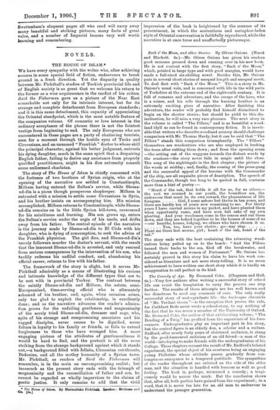Back o' the Moon, and other Stories. By Oliver Onions.
(Kurd and Blackett. 6s.)—Mr. Oliver Onions has given his readers good measure pressed down and running over in his new book. He is not content with the first story, "Back o' the Moon," which, printed in large type and with good margins, would have made a full-sized six-shilling novel. Besides this, Mr. Onions puts in several short stories of unequal length and unequal merit. To deal first with "Back o' the Moon." This is a story in Mr. Onions's usual vein, and is concerned with life in the wild parts of Yorkshire at the extreme end of the eighteenth century. It is full of romance and adventure, and the escape of the hero, who is a coiner, and his wife through the burning heather is an extremely exciting piece of narrative. After finishing this adventure, the reader will probably find himself disinclined to begin on the shorter stories ; but should he yield to this dis- inclination, he will miss a very rare pleasure. The next story in the volume is called "The Pillers," and is as beautiful a wood- land idyll as can be found in contemporary fiction. It is inevit- able that writers who describe woodland scenery should challenge comparison with Mr. Thomas Hardy, but it can be said that "The Pillers" stands this comparison triumphantly. The "Pillers" themselves are woodcutters who are also employed in barking the trees after cutting them down ; and from the opening scene —the setting out of the waggons towards the distant wools by the seashore—the story never fails in magic until the close. The song of the nightingale in the first chapter ; the picture of the woods at midday ; and, finally, the coming of the press-gang and the successful appeal of the heroine with the Commander of the ship, are all exquisite pieces of description. The speech of the Commander, though too long to be quoted in full, contains more than a hint of poetry :—
" Heart o' the oak, that holds it all for us, for us others— the rest we scorned in our youth, the boundless sea, the endeavour that must be its own reward, the pleasantness of life foregone Girl, I come ashore but thrice in ten years, and there are hardly ten of years now remaining to me. For thirty years I have carried acorns in my pocket, and have planted them when opportunity came, and have seen tall oaks of my own planting. And your woodsmen come in the season and out them down, and they are bolted together to be the houses of some of us —our hearths, homes, lodging, we others who have chosen it so.
You, too, have your choice ; go—nay stay. . . . . . Plant me these last acorns, girl ; heart o' the oak, heart o' the oak."
The story ends with the boat containing the returning wood- cutters being pulled up on to the beach : "And the Pillers turned their backs to the sea, filed off the breakwater, and followed the men and women of Portsannet." Mr. Onions has certainly proved in this story his claim to have his work con- sidered as literature and not mere story-telling. It is no mean achievement to have written one short story which it is hardly an exaggeration to call perfect in its kind.






























































 Previous page
Previous page